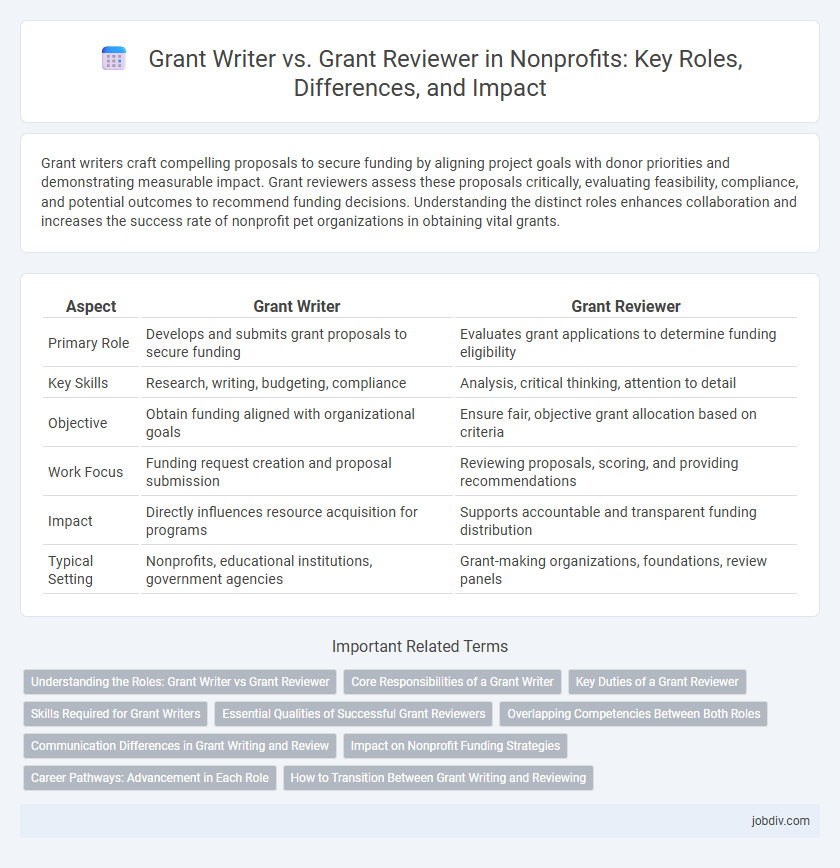Grant writers craft compelling proposals to secure funding by aligning project goals with donor priorities and demonstrating measurable impact. Grant reviewers assess these proposals critically, evaluating feasibility, compliance, and potential outcomes to recommend funding decisions. Understanding the distinct roles enhances collaboration and increases the success rate of nonprofit pet organizations in obtaining vital grants.
Table of Comparison
| Aspect | Grant Writer | Grant Reviewer |
|---|---|---|
| Primary Role | Develops and submits grant proposals to secure funding | Evaluates grant applications to determine funding eligibility |
| Key Skills | Research, writing, budgeting, compliance | Analysis, critical thinking, attention to detail |
| Objective | Obtain funding aligned with organizational goals | Ensure fair, objective grant allocation based on criteria |
| Work Focus | Funding request creation and proposal submission | Reviewing proposals, scoring, and providing recommendations |
| Impact | Directly influences resource acquisition for programs | Supports accountable and transparent funding distribution |
| Typical Setting | Nonprofits, educational institutions, government agencies | Grant-making organizations, foundations, review panels |
Understanding the Roles: Grant Writer vs Grant Reviewer
Grant writers develop compelling proposals to secure funding, conducting detailed research and aligning project goals with grant criteria to maximize success rates. Grant reviewers evaluate submissions for compliance, relevance, and potential impact, ensuring funding is allocated to projects that best meet the grant's objectives. Understanding these distinct roles improves collaboration and strengthens the overall grant management process within nonprofit organizations.
Core Responsibilities of a Grant Writer
A Grant Writer is responsible for researching funding opportunities, crafting compelling proposals tailored to each grantor's priorities, and ensuring all application materials meet detailed guidelines and deadlines. They collaborate closely with nonprofit staff to gather accurate data, articulate program goals, and demonstrate impact through clear narratives and budgets. Core responsibilities also include maintaining grant calendars, tracking submissions, and adapting proposals based on funder feedback to maximize funding success.
Key Duties of a Grant Reviewer
Grant reviewers meticulously evaluate grant proposals against established criteria, ensuring alignment with funding objectives, feasibility, and potential impact. They assess budget accuracy, program design, and organizational capacity to recommend the most promising projects for funding. Their critical analysis and unbiased judgment help nonprofits secure resources that maximize community benefits and program success.
Skills Required for Grant Writers
Grant writers require exceptional research and writing skills to craft compelling, well-structured proposals that align with funders' priorities and guidelines. Strong attention to detail and the ability to synthesize complex information into clear, persuasive narratives are essential for securing funding. Proficiency in project management and understanding nonprofit financials further enhance a grant writer's effectiveness in developing realistic budgets and timelines.
Essential Qualities of Successful Grant Reviewers
Successful grant reviewers demonstrate keen analytical skills, assessing proposals with objectivity and attention to detail to ensure alignment with funding priorities. They possess strong communication abilities to provide clear, constructive feedback that aids in proposal refinement. Ethical integrity and impartiality are indispensable qualities, fostering trust and fairness throughout the review process.
Overlapping Competencies Between Both Roles
Grant writers and grant reviewers both demonstrate strong analytical skills, a deep understanding of funding criteria, and expertise in grant proposal structure. Each role requires proficiency in evaluating project goals, budget alignment, and compliance with donor guidelines. Effective communication and attention to detail are crucial competencies that enhance success in crafting and assessing grant applications.
Communication Differences in Grant Writing and Review
Grant writers emphasize clear, persuasive communication tailored to funders' priorities, ensuring proposal narratives align with funding criteria and effectively convey the nonprofit's impact. Grant reviewers focus on objective, critical analysis, assessing proposals for completeness, feasibility, and alignment with funding guidelines while providing constructive feedback. The communication difference lies in grant writers' storytelling to secure funding versus reviewers' evaluative clarity to uphold program standards.
Impact on Nonprofit Funding Strategies
Grant writers play a critical role in shaping nonprofit funding strategies by crafting compelling proposals that align with funders' priorities, directly influencing the success rate of grant applications. Grant reviewers impact funding strategies from the evaluation side, providing insights on proposal quality, compliance, and alignment with strategic goals, which helps nonprofits refine their funding approaches. Understanding the interplay between grant writers and reviewers enhances the effectiveness of securing diverse and sustainable funding sources for nonprofits.
Career Pathways: Advancement in Each Role
Grant writers typically advance by developing expertise in proposal development, fundraising strategies, and donor relations, often moving into senior grant writing or development manager roles. Grant reviewers gain career progression through valuation, compliance oversight, and strategic funding decisions, leading to positions such as program officer or grants manager. Both career pathways emphasize deep knowledge of grant lifecycle processes, but grant writers focus more on creation and persuasion, while reviewers prioritize evaluation and accountability.
How to Transition Between Grant Writing and Reviewing
Transitioning from grant writing to grant reviewing involves developing a deep understanding of funding criteria and proposal evaluation standards to assess applications critically. Grant writers can leverage their experience by studying common review rubrics and participating in workshops or mentorship programs that focus on unbiased assessment techniques. Building relationships with funding agencies and expressing interest in review opportunities also facilitates a smoother transition between these complementary roles.
Grant Writer vs Grant Reviewer Infographic

 jobdiv.com
jobdiv.com